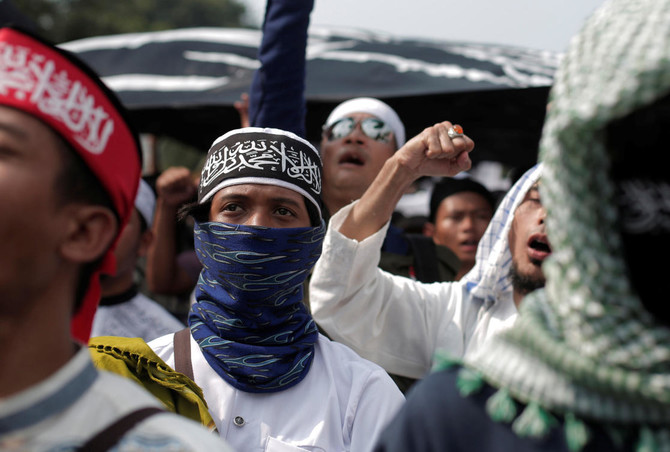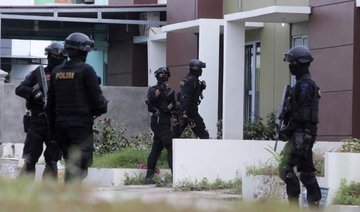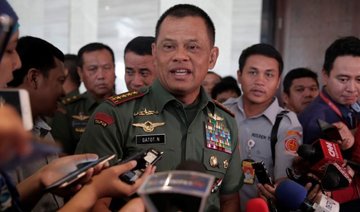JAKARTA: Around 1,000 Indonesians, led by hard-line Islamist groups, protested outside parliament on Tuesday as lawmakers approved a presidential decree banning any civil organizations deemed to go against the country’s secular state ideology.
Tuesday’s approval puts into law a policy President Joko Widodo set in a decree in July. The policy was aimed at containing hard-line groups who have cast a shadow over the long-standing reputation for religious tolerance in the world’s largest Muslim-majority nation.
“We have seen mass organizations that are against the Pancasila (state ideology) and have created social conflict,” said Arya Bima, a lawmaker in favor of the policy. “This law doesn’t impede freedom of organization or assembly, it strengthens it.”
In late 2016 and early this year, groups such as Hizb-ut Tahrir Indonesia (HTI) and the Islamic Defenders Front (FPI), which call for Islamic law to be imposed in Indonesia, led mass street rallies attacking Jakarta’s governor, a Christian, whom they accused of insulting Islam.
Basuki TjaHajja Purnama, who in April lost an election to get a new term, was jailed one month later after being convicted of blasphemy, in a court ruling widely criticized in Indonesia and overseas as unjust.
The presidential decree Widodo signed in July ordered the disbanding of all organizations deemed to be in conflict with the secular state ideology. HTI, which seeks to establish an Islamic caliphate, was the first organization to be disbanded under the policy.
Pancasila or ‘five principles’ is Indonesia’s state ideology, which includes belief in god, the unity of the country, social justice and democracy, and which enshrines religious diversity in an officially secular system.
Under the new law, anyone who “embraces, develops of spreads ideology that is in conflict with the (state ideology) Pancasila” can face imprisonment of six months to life, according to a copy of the draft law reviewed by Reuters.
Rights activists and civil organizations have decried the move, saying it harks back to the era of authoritarian ruler Suharto, who demanded loyalty to Pancasila and took repressive measures against some opponents.
Opposition lawmaker Al Muzamil Yusuf said the new law could “violate democratic rights and remove checks and balances on the government.”
During the protest outside parliament on Tuesday, around 5,200 police and military personnel stood guard around the complex in central Jakarta.
A hashtag supporting Widodo’s policy was a top trending topic on Indonesian Twitter.
“This policy is not about (Widodo) or any political party, it’s about safeguarding the unity of the country,” said user @Senopati
Indonesia passes law to ban organizations deemed against its ideology
Indonesia passes law to ban organizations deemed against its ideology

Nigeria tanker truck blast toll rises to 86: rescuers

LAGOS: The death toll from the explosion of a petrol tanker truck in Nigeria that killed people rushing to gather fuel has risen to 86, emergency services said Sunday.
"The final death toll from the tanker explosion is 86," said Ibrahim Audu Husseini, spokesman for the National Emergency Management Agency in Niger state.
The truck carrying 60,000 litres of gasoline exploded after flipping over on a road in the centre of the country on Saturday, authorities said.
Pope Francis calls for Gaza ceasefire to be ‘immediately respected’

- Pope Francis: I also hope that humanitarian aid will even more quickly reach... the people of Gaza, who have so many urgent needs
VATICAN CITY: Pope Francis called Sunday for a ceasefire in Gaza to be “immediately respected,” as he thanked mediators and urged a boost in humanitarian aid as well as the return of hostages.
“I express gratitude to all the mediators,” the Argentine pontiff said shortly after the start of a truce between Israel and Hamas began.
“Thanks to all the parties involved in this important outcome. I hope that, as agreed, it will be immediately respected by the parties and that all the hostages will finally be able to go home to hug their loved ones again,” he said.
“I pray so much for them, and their families. I also hope that humanitarian aid will even more quickly reach... the people of Gaza, who have so many urgent needs,” Francis said.
“Both Israelis and Palestinians need clear signs of hope. I hope that the political authorities of both, with the help of the international community, can reach the right two-state solution.
“May everyone say yes to dialogue, yes to reconciliation, yes to peace,” he added.
A total of 33 hostages taken by militants during Hamas’s Oct. 7, 2023 attack on Israel are scheduled to be returned from Gaza during an initial 42-day truce.
Under the deal, hundreds of Palestinian prisoners are to be released from Israeli jails.
The truce is intended to pave the way for an end to more than 15 months of war sparked by Hamas’s attack, the deadliest in Israeli history.
It follows a deal struck by mediators Qatar, the United States and Egypt after months of negotiations, and takes effect on the eve of Donald Trump’s inauguration as US president.
Bangladesh seeks arrest of MP cricketer over bounced cheques

- Bangladesh court issues warrant for Shakib Al Hasan for bounced cheques totaling $300,000
- Hasan is a former lawmaker from the party of autocratic, ousted ex-leader Sheikh Hasina
Dhaka: A Bangladeshi court issued an arrest warrant on Sunday for cricket star Shakib Al Hasan for bounced cheques totalling more than $300,000, in the latest blow for the ousted lawmaker.
“The court has previously summoned Shakib but he did not appear at the court,” said Mohammed Shahibur Rahman from the IFIC Bank, which filed the case.
“Now, the court has issued the warrant,” he said.
Shakib is a former lawmaker from the party of autocratic ex-leader Sheikh Hasina, who was overthrown by revolution and fled by helicopter to India in August 2024.
His links to Hasina made him a target of public anger and he was among dozens facing murder investigations for a deadly police crackdown on protesters during the uprising.
He has not been charged over those allegations.
Shakib was playing in a domestic Twenty20 cricket competition in Canada when Hasina’s government collapsed and has not returned to Bangladesh since.
The left-arm allrounder has played 71 Tests, 247 one-day internationals and 129 Twenty20s for Bangladesh, taking a combined 712 wickets.
However, he was left out of the 15-man squad for the one-day international tournament in the Champions Trophy in Pakistan and Dubai next month.
Najmul Hossain Shanto will captain the side, with Bangladesh placed in Group A alongside India, Pakistan and New Zealand.
UK family visa applicants from war-torn countries caught in bureaucratic limbo

- Home Office granting just a handful of waivers to people in countries where biometric information cannot be collected
- Those seeking refuge from Gaza, Sudan and Afghanistan among those awaiting authorization
LONDON: Refugees trying to escape Gaza, Sudan and Afghanistan and join family members in the UK are in limbo between government bureaucracy and a lack of biometric processing facilities.
As part of the family reunification visa application process, applicants must submit biometric information, usually including a fingerprint, at centers in the countries from which they apply.
But such centers often either do not exist in war-torn areas or the facilities are not available to gather the information. This means applicants must either complete the biometric processing once in the UK or be excused from the biometric process entirely.
Figures published by The Guardian on Saturday, however, show that just a handful of these deferrals or exemptions have been granted by the UK.
As of May 2024, 114 people had requested to have their applications “pre-determined” by delaying the submission of biometric data until reaching the UK. Another 84 people had requested to be excused from providing biometric information altogether. By February 2024, just eight predetermination cases and one excusal had been authorized.
The highest number of the requests came from Palestinians and those in Afghanistan and Sudan, where visa application centers have been forced to close due to conflict.
Members of parliament and charities have accused the Home Office of blocking people such in areas from joining their families in the UK.
They compared it to the situation in Ukraine, where people can apply for family reunification visas in the UK without submitting biometrics beforehand.
“The UK rightly welcomed Ukrainian refugees fleeing war. Why can’t the same compassion be shown to people from Gaza and elsewhere?” a coalition of independent MPs, including former Labour Party leader Jeremy Corbyn, told The Guardian.
Nick Beales, head of campaigns at the charity RAMFEL, which helps vulnerable migrants access justice, said: “This disclosure proves that it was actually impossible for people in conflict zones, such as Sudan and Gaza, to apply for visas even when they had clear family ties in the UK.”
A Home Office spokesperson told The Guardian they understood applicants may face challenging circumstances to reach a visa application center to submit biometrics, saying: “That is why individuals have the option to submit a biometric deferral request, which is assessed on its own merits, and exceptional circumstances are considered.”
Taliban deputy tells leader there is no excuse for education bans on Afghan women and girls

- The Taliban government has barred Afghan females from education after sixth grade
- There are reports authorities had also stopped medical training and courses for women
A senior Taliban figure has urged the group’s leader to scrap education bans on Afghan women and girls, saying there is no excuse for them, in a rare public rebuke of government policy.
Sher Abbas Stanikzai, political deputy at the Foreign Ministry, made the remarks in a speech on Saturday in southeastern Khost province.
He told an audience at a religious school ceremony there was no reason to deny education to women and girls, “just as there was no justification for it in the past and there shouldn’t be one at all.”
The government has barred females from education after sixth grade. Last September, there were reports authorities had also stopped medical training and courses for women.
In Afghanistan, women and girls can only be treated by female doctors and health professionals. Authorities have yet to confirm the medical training ban.
“We call on the leadership again to open the doors of education,” said Stanikzai in a video shared by his official account on the social platform X. “We are committing an injustice against 20 million people out of a population of 40 million, depriving them of all their rights. This is not in Islamic law, but our personal choice or nature.”
Stanikzai was once the head of the Taliban team in talks that led to the complete withdrawal of foreign troops from Afghanistan.
It is not the first time he has said that women and girls deserve to have an education. He made similar remarks in September 2022, a year after schools closed for girls and months and before the introduction of a university ban.
But the latest comments marked his first call for a change in policy and a direct appeal to Taliban leader Hibatullah Akhundzada.
Ibraheem Bahiss, an analyst with Crisis Group’s South Asia program, said Stanikzai had periodically made statements calling girls’ education a right of all Afghan women.
“However, this latest statement seems to go further in the sense that he is publicly calling for a change in policy and questioned the legitimacy of the current approach,” Bahiss said.
In the Pakistani capital, Islamabad, earlier this month, Nobel Peace Prize laureate Malala Yousafzai urged Muslim leaders to challenge the Taliban on women and girls’ education.
She was speaking at a conference hosted by the Organization of Islamic Cooperation and the Muslim World League.
The UN has said that recognition is almost impossible while bans on female education and employment remain in place and women can’t go out in public without a male guardian.
No country recognizes the Taliban as the legitimate rulers of Afghanistan, but countries like Russia have been building ties with them.


















